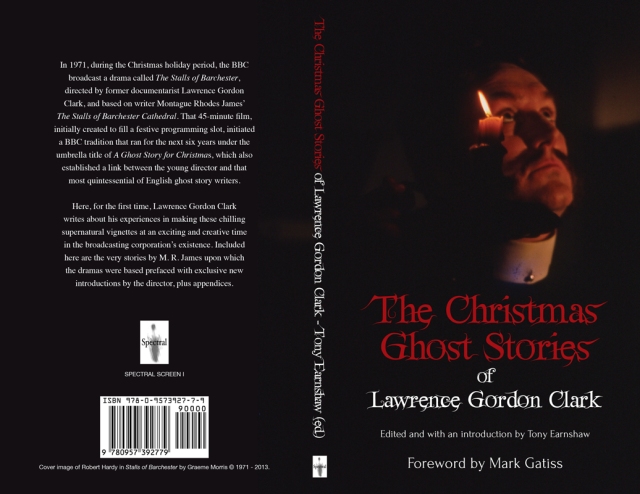I have vague, somewhat confused memories of watching the BBC's ghost stories for Christmas. Back in the Seventies I was just old enough to watch them, but perhaps not old enough to appreciate them. I had no idea who M.R. James was (shocking, I know). It was only later that I came to the original stories and began to retrospectively grasp what it was I'd been watching, with a certain thrilled bafflement, about ten years earlier.
Spectral Press have produced a volume that would have been very valuable to my younger, spottier self. In it are all the M.R. James stories that were directed by Lawrence Gordon Clark, plus one that he would have liked to attempt. Seeing them listed on the contents page makes you appreciate just how well-served ghost story fans were. In his foreword Mark Gatiss points out that Clark, originally a documentary film maker, brought a 'stillness, a weird beauty, and a rather brilliant management of the ghostly shocks' to adaptations that have yet to be bettered. As sometimes happens, a fine telly tradition was created because a talented, energetic man wanted to share his enthusiasm.
In an informative introduction, editor Tony Earnshaw gives a detailed account of how Clark set out to create - with relatively little in the way of resources - short films that still stand up remarkably well today. It's clear that Clark assembled an excellent team behind the camera as well as recruiting some superb actors as his stars. One interesting point that had never occurred to me is that, as the stories went out late at night, there was often nothing to follow them. This meant there was no set length for the ghost stories, so Clark could let his script reflect the original narrative rather than have to indulge in padding or cutting. Thus his films varied in length from 32 to 50 minutes.
Tony Earnshaw is also helpful on locations and the way that Clark kept each script relatively fluid, adapting it to suit a particular place. 'Firmly of the opinion that film is a visual rather than a dialogue driven medium—and heavily influenced by his hero, Alfred Hitchcock—Clark allowed his camera to tell the story. Dialogue, he felt, was merely an enhanced form of sound effect.' This explains why, at their best, Clark's films have the impact of the best silent movies.
Perhaps the most interesting parts of the book, though, are Clark's own observations on each film. Thus for the first, 'The Stalls of Barchester Cathedral' (1971), he writes about the great creative freedom that the BBC permitted its staff at that time. He could work 'uncluttered by the array of developers, script editors, executive producers and other indispensables who have since concretised in a great abscess round the system that is broadcasting today'.
By the time we get to 'Casting the Runes' Clark has moved on to ITV and is working on a script by Clive Exton. I was surprised to find that he considers the ending of this drastically updated version 'satisfyingly grim'. I thought it was a bit barmy. I also think it's a great pity that Basil Copper's script for 'Count Magnus' was never filmed, in part because of expense, but also because 'it was felt by some people in the BBC that we should attempt more modern ghost stories so the project was shelved'. Things were clearly becoming 'concretised' by that point.
The most substantial part of the book consists of transcripts of two interviews with Lawrence Gordon Clark that Tony Earnshaw conducted at the Halifax Ghost Story Festivals of 2010 and 2012. I was lucky enough to be present for the first of these. There's much to enjoy here, not least Clark's bold (and, for my money, not unreasonable) assertion that many Hammer films are 'very overlit and lacking in atmosphere'.
All in all, this is a very absorbing read. It's also a heartening reminder of how much can be achieved where creative freedom reigns, in television and elsewhere.





4 comments:
Excellent post. This book suddenly became a must have. Interesting point about Clark being a documentary filmmaker. It's just perfect because James stories are anything but sensational. If only today's filmmakers would study these excellent adaptations.
Regarding the Hammer films. They were a bit bright, but some did have atmosphere, particularly films like The Reptile and The Gorgon. Also, it seemed at times as if many of the actors overplayed their lines. One can only wonder what would have resulted had a director like Jack Clayton (The Innocents) or Robert Wise (The Haunting) helmed a few. Still, I have to admit I'd rather watch a Hammer film than watch most of what passes for "horror" these days.
Re the clip: it's interesting how Clark embellishes on the original story. James insinuates that the spiders are the witch's progeny. Clark runs with this idea, so that the creatures have the characteristics of both spiders and babies. The shot of one scampering in through the window is particularly realistic!
Although Dougal's 'Spiderbaby' did spring to mind...
http://www.youtube.com/watch?v=3xkOBvcAO1o
Watch out for the Beast of Craggy Island...
Post a Comment